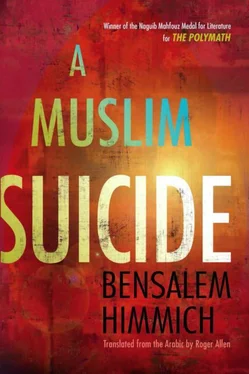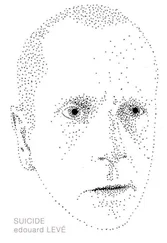It was only a few days after this notable victory that what I had already predicted actually happened. Baybars had Qutuz, his rival, murdered, thus adding to the list of his victims (among whom in recent times had been Al-Malik Turan Shah, the Ayyubid). He was thus able to claim the sultanate for himself exclusively. God alone is the victor!
A WONDERFUL DAY to be recorded in letters of gold: the tenth day of Dhu alQa`da in the year 660 AH [1262 CE]. In the evening the warden Yasir came up to my room and told me to accompany him at once; my eyes would be delighted by what he had to show me. I followed him, albeit with a certain concern since I was worried that Sitt Umama might be involved. However, no sooner had he opened the door to a room opposite the garden than I set my eyes on my beloved friend Al-Shushtari, lying in bed. He managed to sit up, albeit with a good deal of effort. We embraced each other warmly and shed some tears. After such a prolonged time apart, I was delighted to see him again, so delighted in fact that, like him, I could not stop crying. Beyond that, I was distressed to find him in such poor health, obviously a direct consequence of his heroic participation in the fighting against the Crusader forces at Damietta.
I began by asking him how he was.
"Saint of God," he sobbed in reply, "the fact that you were so far away was the only thing that kept me feeling miserable. In fact, I still managed to be with you several times in my dreams and debated matters with you. Not only that, but I also mentioned you, with all due humility, in some of my poems. As I told you in my letter, your wife and family are safe and sound in Tangier, God be praised! All they're hoping for is your safe return and the possibility of seeing your luminous countenance again when the clouds thrown up by your enemies have finally dissipated along with the political machinations of the people who wish you ill. Concerning your students, I have only learned a very little, and even that is not very reliable."
"But what about you, Abu al-Hasan?"
"You can see for yourself. This Muslim is in bad shape. My bones are weak, and my hair has turned white. I need a cane to walk. But, in spite of everything, my enthusiasm is still as strong as yours, full of aspirations-thank God!"
I urged him to get as much rest and sleep as he could, otherwise he would wear himself out talking and answering questions. I instructed Ghaylan to do everything necessary to arrange his quarters and carry out whatever functions Al-Shushtari might need. It was sunset on the following day when the holy man woke up again. I paid him a call after evening prayer and found him much recovered and fully ready to sit up and chat.
Ghaylan came in, greeted us both, and placed some food on the table. I asked him if he would like to perform the pilgrimage again this season, adding that, with God's aid, I intended to do it myself along with my companion. Ghaylan's eyes sparkled as he responded that he would indeed like to do so.
"My dear colleague," said Al-Shushtari, "I've been away from these blessed regions for a very long time. I'm longing to perform the pilgrimage and stand at 'Arafa. To be able to perform my last pilgrimage in the company of a beloved colleague such as yourself is an additional boon."
"So then, Abu al-Hasan," I responded gently, "we'll perform the pilgrimage together. And, God willing, there'll be others to follow."
We prayed the evening prayer together on the roof. Once that was finished, we sat there under a sky glittering with pearly stars and exchanged information that each of us thought was important. Al-Shushtari told me that the death of Ibn Khalas, governor of Sabta, had been confirmed; he had drowned while escaping to Tunis. He had vigorously objected to the general tyranny and corruption of his successor as governor, whose evil conduct was only rivaled by the boorish and uncouth governor of Tangier. By now, the Almohad sultan had completely abandoned all interest in Andalus and was completely preoccupied with protecting the few cities still under his control from the ever-growing power of the Marinids. Hearing all this, I begged God to show some of His kindness.
For my part, I told Abu al-Hasan about Sitt Umama, my Meccan students, and my meeting with Abu Numa and my favorable impression of him. He shared my opinion and confirmed my intuition about this sharif's leanings toward Shiite belief and his general support for ascetics and mystics. Abu alHasan then went on to tell me somewhat bashfully that in Bijaya he had married a worthy lady whose company and assistance he sorely needed today. I offered him my blessings on his marriage and prayed that both of them would be happy and healthy.
As night pursued its relentless course, we moved to a discussion of Baybars and his defeat of the Mongol armies. We both agreed that this sultan's primary demand would be to be made caliph now that the Abbasid dynasty had collapsed. In doing so, he would have to rely on the opinions of pedantic jurists who were as lily-livered as they were unprincipled. This Mamluk would then proceed to impose Sunni doctrine, relying in doing so on spear tips and sword blades. Invoking God's mercy and sympathy, we asked ourselves how it was that, every time extraordinary caliphs or remarkable generals made an appearance on history's stage, they decided to impose religion by force, either imprisoning or else killing off all liberal thinkers who derive their inspiration from the spirit of God and the pure scent of discretion and ease. Both of us cited the names of Mu'tazilites* and others who had been killed during the controversy over the created nature of the Qur'an. Abu al-Hasan made an emotional reference to Abu Mansur al-Hallaj, while I raised the fate of Shihab al-din al-Suhrawardi, known as "the slain Sufi," intending, as I did so, to ask my colleague about an issue that had been bothering me from time to time.
"Abu al-Hasan," I said, "I've memorized this saying of al-Suhrawardi: `If there is something in existence that does not need to be defined and explained, then it is clear. Nothing in existence is clearer than light, so, of all things, it needs definition the least. (End of quotation).' With that in mind and in direct opposition to it, darkness-taking into account Al-Suhrawardi's comment (he being the shaykh of the Illuminists)-is too broad to be encompassed by a definition, to such an extent that there can be no end to its parameters and thus no specific definition and no determination of its precise dimensions."
For a while my companion stared at me pensively, suggesting that either he had fully grasped what I was aiming at or else was encouraging me to continue and clarify what I meant.
"My dear colleague," I went on, "when discussing the topic of death, there are people who talk about it in lofty, abstract terms. They find it most appropriate to invoke all kinds of figurative language, such as the journey, the end of a timespan, or transfer to the love of God. They cover up its tragic aspects with such expressions as `delayed, but not overlooked,' or `when it happens to everyone, it is not so cruel.' Other people treat death as a matter to be hushed up and hidden away, as though it were something private and unmentionable. Still others choose to decline the death verb in the first person, using expressions of relief and even welcome. Some people are panic-stricken, while others laugh defiantly. On this particular subject I myself have not settled on one view or another; or, more accurately, it depends on the circumstances involved. Like some compulsive traveler I move from one camp to another. That at least was the way I used to consider the issue until a point a while ago when the thought of the possibility that I might die at the hands of Sultan Baybars began to preoccupy my mind, as it must have done Al-Suhrawardi, who was killed by Salah al-din the Ayyubid (albeit in very different times and circumstances). `Every soul tastes death.' In any case, I pray to God that he will protect me from an evil end at the hands of the forces of compulsion and intolerance."
Читать дальше












